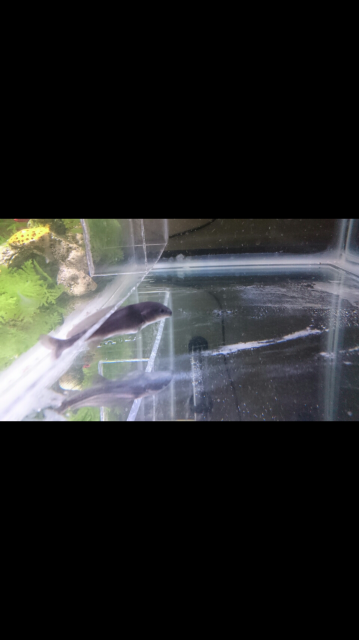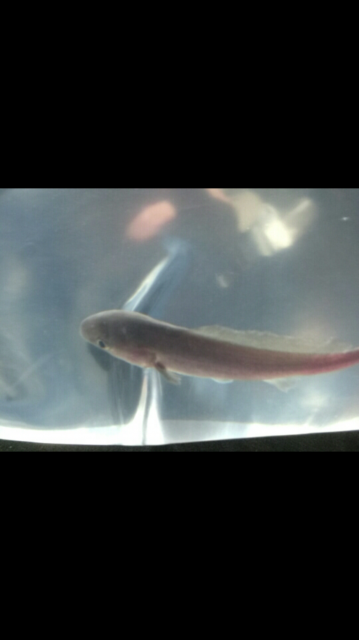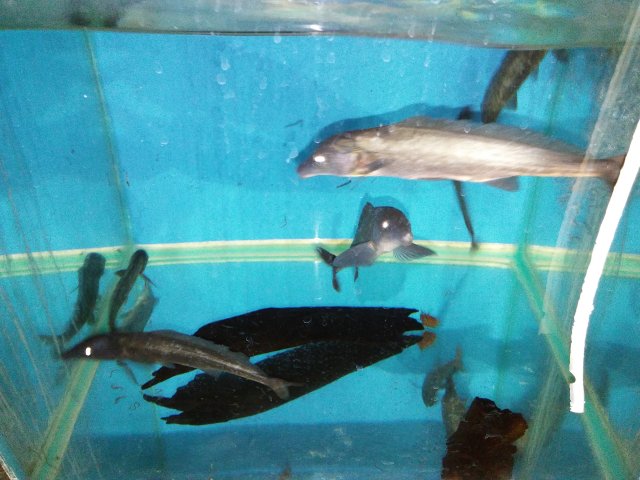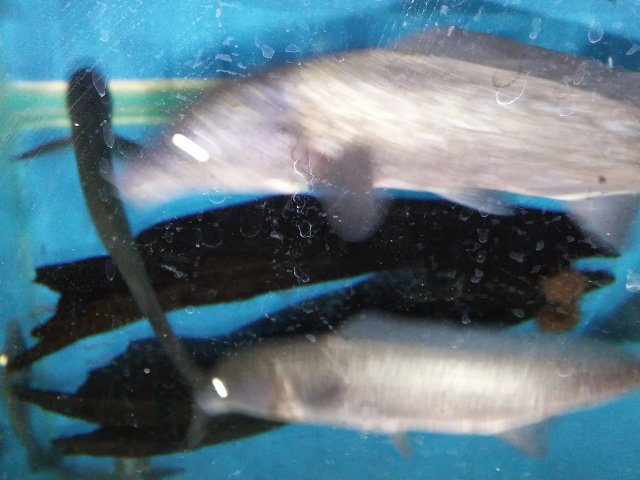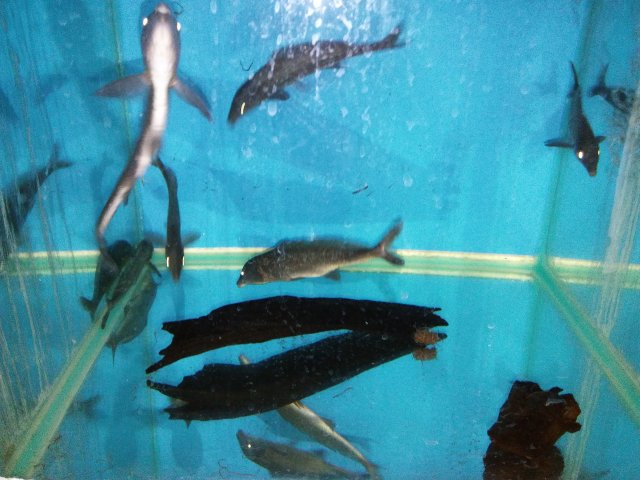Dolphin Mormyrid/Morymus?
- Thread starter M@T!@$
- Start date
You are using an out of date browser. It may not display this or other websites correctly.
You should upgrade or use an alternative browser.
You should upgrade or use an alternative browser.
I tried them once but sadly couldnt keep them alive... i know they are extremely sensitive fish that like pristine water comditions to really thrive...
I heard they get 3', and are also super playful and smartI tried them once but sadly couldnt keep them alive... i know they are extremely sensitive fish that like pristine water comditions to really thrive...
I might try raising one
They can be aggressive within the same species.with any other type fish it's pretty mellow.somewhat prone to strong dosage meds.very intelligent indeed
That's true, my friend bought 2 and the larger one killed the other
Is $60 a good price for these guys?
Fair price for med sizeThat's true, my friend bought 2 and the larger one killed the other
Is $60 a good price for these guys?
That's awesome! Are they easy to get on pellets? Or are they more blood worm/ shrimpFair price for med size
I compiled info on these guys, in hopes of a sticky! lol. I have had tough luck with these fish. They mysteriously die, or are super sensitive. THe longest I have kept one is 6 months. Cherish the time you keep the fish, I wish you all the luck in the world!
Mormyrid Sticky:
Family:
Mormyridae
Origin:
African Lakes and River Systems
Care Level:
Advanced/Difficult
Environment:
A soft sandy substrate is a must, as they forage for food and will cut their faces on sharper gravel. Hiding spots, caves, tubes, and floating cover will make them more comfortable as well.
They prefer a low light environment, probably due to their poor eyesight. Also, since these fish use electricity hunt food and move around, be mindful of putting electrical devices such as heaters, powerheads and large cleaner magnets in the tank itself.
Toys:
Mormyrids live up to their nickname of “Baby Dolphins” because they are so inquisitive and playful. They will herd or chase around their tank mates--sometimes relentlessly. This type of energy can be transferred into play with toys! Mormyrids will balance ping pong balls on their snouts, swim through hoops, and more! I have successfully used ping pong balls that are filled with water, Marimo live moss balls, and plastic bracelets as hoops. Here's a video that shows what I'm talking about.
pH:
6.5-7.5 This is a general guideline.
Temperature:
72-80 F
In my experience, mormyrids are sensitive to temperature fluctuations. I have lost fish due to a 40-50% water change where the new water brought the tank temp down only 10 degrees. Proceed with caution as these fish thrive in a stable conditions.
Hardness dH:
5
Min. Tank Size:
30gl for Juveniles, adults need at least a 300g due to their large size.
Max. fish size in aq:
26", although imported specimens are rarely over 8” in length. These guys grow really slow.
Compatibility:
Reports are mixed. Temperment seems to vary from fish to fish. Some specimens can coexist peacefully with tank mates, others will need to be kept singularly as they will constantly harass other fish. Some fish keepers have kept mormyrids successfully in species groups, however, there seems to be more anecdotal evidence to refute this claim. In my experience, I started with 6 specimens in a species tank, over 3 months I was down to only 1 fish (think Baby Dolphin Hunger Games).
If you are attempting to house a mormyrid with other fish, African Cichlids are pretty hardy, and when kept in a large group, the aggression is spread out. Currently, I have my mormyrus with a few guppies that it pays no attention to. Previously, the same mormyrus bullied and killed a bocourti cichlid and motoro stingray pup. So, if you plan on trying tank mates, have a backup plan!
Diet:
These guys are almost exclusively carnivores. Worms are the preferred food of choice. If you can get them on frozen bloodworms, there is less of a risk of introducing disease with live worms. Ghost shrimp, snails, and small pellets will also be accepted if you are lucky.
Reproduction:
egg layer
Health and disease:
These scaleless fish are extremely sensitive to medicine and salt. They typically arrive in rough shape from importers and are known to carry external parasites. They may present with what looks like ich on their faces but I believe is some type of acne. These tiny white bumps come and go, and can be seen in many fish. More info to follow.
Mormyrid Sticky:
Family:
Mormyridae
Origin:
African Lakes and River Systems
Care Level:
Advanced/Difficult
Environment:
A soft sandy substrate is a must, as they forage for food and will cut their faces on sharper gravel. Hiding spots, caves, tubes, and floating cover will make them more comfortable as well.
They prefer a low light environment, probably due to their poor eyesight. Also, since these fish use electricity hunt food and move around, be mindful of putting electrical devices such as heaters, powerheads and large cleaner magnets in the tank itself.
Toys:
Mormyrids live up to their nickname of “Baby Dolphins” because they are so inquisitive and playful. They will herd or chase around their tank mates--sometimes relentlessly. This type of energy can be transferred into play with toys! Mormyrids will balance ping pong balls on their snouts, swim through hoops, and more! I have successfully used ping pong balls that are filled with water, Marimo live moss balls, and plastic bracelets as hoops. Here's a video that shows what I'm talking about.
pH:
6.5-7.5 This is a general guideline.
Temperature:
72-80 F
In my experience, mormyrids are sensitive to temperature fluctuations. I have lost fish due to a 40-50% water change where the new water brought the tank temp down only 10 degrees. Proceed with caution as these fish thrive in a stable conditions.
Hardness dH:
5
Min. Tank Size:
30gl for Juveniles, adults need at least a 300g due to their large size.
Max. fish size in aq:
26", although imported specimens are rarely over 8” in length. These guys grow really slow.
Compatibility:
Reports are mixed. Temperment seems to vary from fish to fish. Some specimens can coexist peacefully with tank mates, others will need to be kept singularly as they will constantly harass other fish. Some fish keepers have kept mormyrids successfully in species groups, however, there seems to be more anecdotal evidence to refute this claim. In my experience, I started with 6 specimens in a species tank, over 3 months I was down to only 1 fish (think Baby Dolphin Hunger Games).
If you are attempting to house a mormyrid with other fish, African Cichlids are pretty hardy, and when kept in a large group, the aggression is spread out. Currently, I have my mormyrus with a few guppies that it pays no attention to. Previously, the same mormyrus bullied and killed a bocourti cichlid and motoro stingray pup. So, if you plan on trying tank mates, have a backup plan!
Diet:
These guys are almost exclusively carnivores. Worms are the preferred food of choice. If you can get them on frozen bloodworms, there is less of a risk of introducing disease with live worms. Ghost shrimp, snails, and small pellets will also be accepted if you are lucky.
Reproduction:
egg layer
Health and disease:
These scaleless fish are extremely sensitive to medicine and salt. They typically arrive in rough shape from importers and are known to carry external parasites. They may present with what looks like ich on their faces but I believe is some type of acne. These tiny white bumps come and go, and can be seen in many fish. More info to follow.


